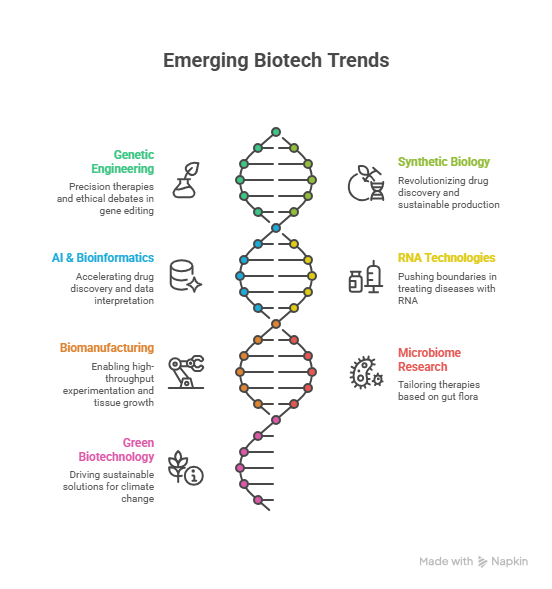Introduction
Biotechnology has become one of the fastest-evolving careers in the life sciences thanks to advancements in genetics, pharmaceuticals, agriculture, and digital health. For students pursuing B.Sc Biotechnology at a top private university in India, being aware of emerging trends is crucial to staying competitive and building impactful careers. In 2025, innovative topics like gene editing, synthetic biology, and AI-powered research are changing the landscape for students and professionals alike.
Top Emerging Biotech Trends in 2025
1. Genetic Engineering & CRISPR
Gene editing technologies, especially CRISPR-Cas9, have drastically transformed research and clinical applications. Genetic engineering now enables precision therapies for inherited diseases, agriculture, and even cancer treatment. The field is expanding into safer gene-editing methods and advances in nanoparticle delivery systems, with ethical debates around germline modifications.
2. Synthetic Biology (SynBio)
Synthetic biology merges biology and engineering, revolutionizing drug discovery, biomaterials, and eco-friendly manufacturing. Engineered organisms are being used as cellular factories, paving the way for sustainable production of pharmaceuticals and biofuels. Valued at over $100 billion by 2030, SynBio is a lucrative field for B.Sc Biotechnology grads.
3. AI, Bioinformatics & Data Analytics
AI and big data are accelerating drug discovery, diagnostics, and protein design. Bioinformatics skills are essential for managing and interpreting large genomic datasets. Students skilled in bioinformatics and programming are in growing demand across pharma, research institutes, and healthcare.
4. RNA Technologies & mRNA Vaccines
RNA research—including mRNA vaccines, RNA interference therapies, and circular RNA—are pushing boundaries in treating cancer, infectious disease, and rare disorders. The rise of RNA-based technologies has created new opportunities in diagnostics, vaccine development, and personalized medicine.
5. Biomanufacturing and Lab Automation
Advanced machinery, robotics, and AI-driven automation enable high-throughput experimentation, quality bioproduction, and scalable bio-manufacturing. Trends like 3D bioprinting and regenerative medicine are making lab-grown tissues and organs a reality.
6. Microbiome Research & Personalized Medicine
Microbiome-based therapies and diagnostics are growing rapidly. Scientists can now leverage gut flora to tailor patient-specific therapies—ushering in the age of personalized medicine in biotechnology.
7. Sustainability & Green Biotechnology
Biotech innovations are driving solutions for climate change, carbon capture, biofortification, bioremediation, and creation of biodegradable materials. Green biotechnology focuses on sustainable agricultural, industrial, and waste management processes.

IIMT University B.Sc Biotechnology Course Details
IIMT University, regarded as one of the top private universities in India, offers a rigorous and industry-oriented B.Sc Biotechnology program. The course is designed to equip students with deep knowledge, practical skills, and strong research orientation for diverse bioscience careers.
Course Structure
-
Duration: 3 years (6 semesters) – Full-time undergraduate science degree.
-
Curriculum Covers: Biomolecules, cellular and molecular biology, genetics, microbiology, biochemistry, immunology, analytical techniques, computational biology, and biotechnology applications.
-
Practical Training: Extensive laboratory work, project assignments, seminars, industry visits, and exposure to advanced instrumentation and molecular methods.
-
Faculty: Experts with research backgrounds, active collaborations, and mentorship.
-
Special Focus: Side courses on NPTEL/MOOCs, R&D, and industrial skills training.
Fees, Facilities & Career Outcomes
-
Course Fee (2025): Approx. ₹72,000 tuition for 3 years.
-
Labs & Campus: State-of-the-art laboratories, regular seminars, conferences, and a vibrant student life.
-
Placements: Strong cell with links to pharma, biotech R&D, healthcare and diagnostic firms. Many students pursue further studies in MSc, MBA biotech, clinical research, or enter employment fields such as QA/QC, production, sales, and analytics.
-
Opportunities: Careers in pharma biotech companies, agricultural science, environmental management, diagnostics, food safety, research or higher education.
Admission Procedure for B.Sc Biotechnology at IIMT University
-
Step 1: Apply online via iimtu.edu.in or visit the university campus.
-
Step 2: Eligibility: 10+2 with Science (PCB/PCM); entrance exam scores (CUET, state/national entrance tests) may be considered.
-
Step 3: Upload documents, pay application fee, and appear for assessment (interview/counseling).
-
Step 4: Confirmation: Document verification and payment of fee upon selection.
-
Scholarships: Available based on merit, early applications, and reserved categories.
FAQs
Q1: What practical skills do I gain in B.Sc Biotechnology at IIMT?
Students learn molecular techniques, genetic engineering, bioprocesses, and data analysis through hands-on labs and real-world projects.
Q2: What are the career options after graduation?
Pharma R&D, diagnostics, bioinformatics, business development, regulatory affairs, higher studies, and biotech entrepreneurship.
Q3: Why choose IIMT University for B.Sc Biotechnology?
IIMT is a top private university in India, recognized for modern infrastructure, academic-industry interface, strong placements, and holistic scientific pedagogy.
Conclusion
The future of bioscience is being shaped by genetic engineering, synthetic biology, AI-driven biotech, and sustainability innovations. Aspiring B.Sc Biotechnology students must understand these emerging trends to transform challenges into career opportunities. With advanced infrastructure, expert mentorship, and strong industry linkages, IIMT University stands out as one of the top biotechnology colleges in India, offering everything future biotech leaders need from trending skills to career support and global exposure.













